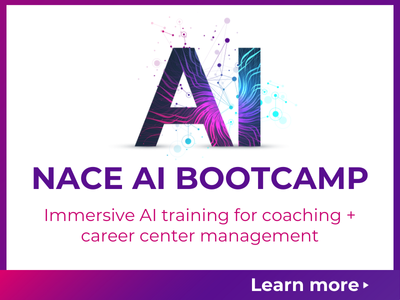An interview workshop at the University of Notre Dame allows students to experience interviews from the perspective of both the interviewer and the interviewee, giving them valuable insight into the process.
The workshops developed and conducted by Erik Oswald, graduate career consultant in the University of Notre Dame’s Meruelo Family Center for Career Development, work best over 90 minutes. The first half is a presentation on interview strategies, common questions, and tips. The second half is autonomous small-group mock interviews.
See Oswald at NACE22
Erik Oswald will present “Autonomous Small-Group Mock Interviews: An Innovative Approach for Scalable Interview Practice” at the NACE 2022 Conference & Expo in Portland, Oregon. Participants will be equipped to run similar events on their campus.Ideally in groups of three, students take turns interviewing each other, rotating through three 10- to 12-minute rounds, depending on how much time is left in the workshop.
“Each student has the opportunity to ask, answer, and observe,” he says.
Oswald says that since the students end up interviewing each other, the burden of recruiting numerous facilitators is removed.
“I provide the students with a set of protocols to follow and questions to ask in each round, as well as tips on what kind of feedback to provide,” he says, adding that this includes feedback on eye contact, posture, confidence, distracting speech, and more.
Because it requires no external mock interviewers, such as alumni, employers, faculty, or other staff, the process is scalable.
“By removing the need for facilitators, the event is limited only by the number of three-person tables you can fit in the room or the number of breakout rooms available on Zoom,” Oswald notes.
“We sacrifice a level of expert feedback in favor of scalability, but we do debrief as a group after each round, during which the students can ask about scenarios they weren’t sure about and I can offer my insights.
“We also trade depth—such as the chance for each student to answer 10 questions like they would in an hour long one-on-one mock interview—for the chance to observe during one of the rounds. Students routinely rate this opportunity to witness an interview from the ‘other side of the table’ as a major benefit of the small-group mock interview format.”
In addition to being scalable, the workshop can be tailored for a variety of contexts. He has conducted it for general interviews, consulting interviews, academic (faculty) interviews, and medical school interviews.
“I simply tweak the content of the first-half presentation and then customize the questions for the students to ask each other,” Oswald explains.
He says the autonomous small-group mock interviews provide several key benefits for both students and the career center:
- Students—Students benefit from the opportunity to practice answering interview questions in a safe, pressure-free, environment. They also gain the opportunity to observe their fellow group members answering questions, and then they provide their own feedback, which engages their interview awareness in a completely different way than they are familiar with. Finally, they always have the opportunity to follow up with a career counselor for further discussion of their interview strategies, if interested, but for many students, the training and practice they receive is sufficient to increase their interview confidence.
- Career centers—The career center gains the ability to provide mock interview experiences to a large number of students with minimal logistical preparation. An added advantage is a significantly reduced lead time. For example, if a student organization requests a mock interview event, with traditional facilitated mock interviews, the career center would need to contact various partners—alumni, employers, faculty, staff, and others—and coordinate schedules in advance of the event. However, with autonomous small-group mock interviews, the only logistical limitation is the room reservation, which is removed when conducting the event virtually via Zoom.
Oswald has learned “quite a few lessons over the course of developing this process, based primarily on student participant feedback. One is that students appreciate having a few minutes to reflect and gather their thoughts in between the presentation and practice portions of the workshop.”
That transition time, he explains, allows them to more effectively practice any new strategies they might have just heard for the first time.
“Another lesson is that some students felt like they are unable to provide feedback to their partners because they do not have a human resources background and, therefore, are unsure what an employer is looking for when interviewing a candidate,” Oswald notes.
“I make sure to confirm that no HR background is needed to evaluate the interpersonal elements of interviewing that I encourage them to focus on.”
He says that, as career centers experience with all types of workshops, attendance can be an issue.
“This is especially true when these workshops are posted generically for self-motivated students to discover and register for on their own,” Oswald says.
“Our ‘all-student’ events that are open to everyone sometimes fail to garner enough participants for even a single three-student small group. The best attendance has come from working with specific departments or academic programs to conduct an exclusive event, especially when it is integrated into their schedule of events that are essentially a required component of their professional development offerings. We have also had success with student organizations hosting an event for just their group.”






